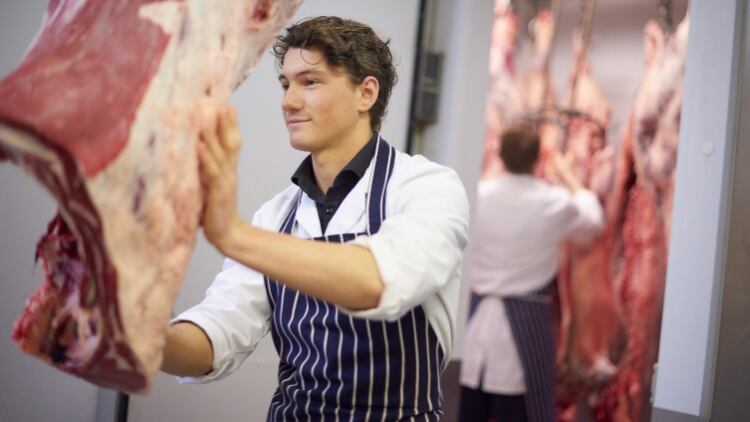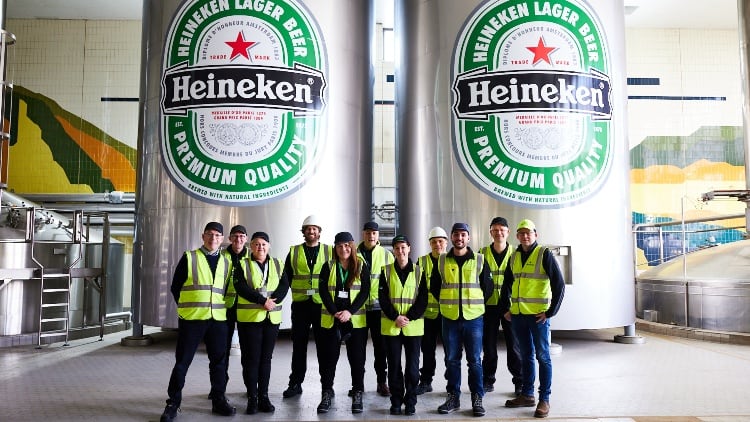Despite a prolonged period of uncertainty, the demand for meat remains high and quality produce is still valued by consumers. In 2022, it was estimated by market research firm, IBIS World, to be worth £9.5bn, with an average growth of 1.6% over the last five years. And data analysts, Statista, predict the fresh meat market, which it gauges at around US$17.25bn (£13.19bn) will grow annually by 4.12% between now and 2028.
Careers in UK meat processing
Meat processing continues to be a large employer in the UK, providing a variety of job roles. But, like many industries within manufacturing, identifying and hiring the best people is a challenge.
For Nick Allen, chief executive of the British Meat Processors Association (BMPA), raising awareness of what a career in the modern meat industry entails is critical to combatting this obstacle. Representing the majority of meat processing businesses in Britain, the BMPA understands the needs of its membership and wants to help communicate these with Government and the wider public.
“The industry has a reputation for being physically taxing, but following the introduction of new equipment, there is huge variation in the type of job roles available,” Allen said.
“It is not just about cutting up large pieces of meat, there is procurement, packaging, assurance. As an industry, we have work to do in making these roles more attractive and accessible.”
Making the meat industry visible
A recent report by Meat Business Women, an organisation with close ties to the BMPA, showed that the perception of the meat industry has improved over the past three years leading to more women filling chief executive and board level positions.
This was partially due to an increase in visibility for the sector, after work was done to remove the old-fashioned impression of meat processing that some people held.
Nan Jones, who joined the BMPA two and a half years ago as technical policy manager, reflected on the variety of skills required by the sector, explaining that many meat firms are actively seeking people with language skills.
“There is now such a diverse culture within the industry,” she told Food Manufacture. “We need to showcase that as a sector, things are growing and changing. People still think it's male dominated or that there's not a job for them, so we need to show that it really is for anyone across lots of different roles.”
Part of the reason that the public may have such perceptions of the meat industry is the result of strict hygiene regulations, which limit the ability for filming inside processing plants.
As a result, much of the technology and automation in use is not visible to the public, something that Allen believes has proven to be a “barrier”.
“The food hygiene standards in a meat plant are higher than you would find in a hospital, so allowing journalists to see what happens inside is really difficult,” he said.
“We certainly get calls from journalists and TV stations, but it is not feasible for most plants because of these hygiene rules. We regularly talk to our members about being a little more open and explaining the different responsibilities employees fulfil, because I think if people saw what goes on at these plants it would be very different from what their perception is.”
Engaging with T-levels
Given that meat processing and production make up a significant part of the UK’s food and drink manufacturing sector, both Jones and Allen feel more could be done at the school level to educate students about how different foods arrive on their plate.
Improving food education, or at least re-emphasising it, would likely push more young people towards a career in the food and drink sector and, in turn, could help ease recruitment concerns.
“I think that overall, there needs to be a lot more about food in the curriculum,” Allen said.
“Not just meat, but the whole food industry. It’s bizarre how many school leavers have never learned about food production when it is such a fundamental part of life.”
Jones is supporting this drive for improved food education and recently took part in a webinar on T-levels, a new technical qualification for young people between the age of 16 and 18.
First awarded in the summer of 2022, T-levels are developed in collaboration with employers and aim to better equip those studying for the world of work.
“It was a great opportunity to engage with students and show them what the opportunities are,” Jones said.
“We need to go into schools and actually show all the opportunities that there are within this industry and within the sector.”
Factory automation and Government focus
Many of these opportunities are linked to the mechanisation processes that have, today, transformed how meat businesses operate.
This has not been an overnight change, but a slow burning evolution that is still yet to reach its peak. During BMPA’s recent Meat Industry 2.0 conference held last month (June 2023), speakers addressed some of the cutting-edge technology, such as automation and robotics, that has helped transform and modernise the sector.
Among them was Hildur Einarsdottir, Marel automation centre manager, who was very clear in her opinions around fully machine-run plants.
Allen recalled her sentiments: “A situation where there are no people working in plants is not achievable. We are always going to need humans operating the machines.”
Government policy will also have a strong influence on the future of the food industry and from the perspective of Allen, the current approach is not working.
He believes that the UK Government is not providing meat processing businesses with confidence and direction, which is holding back investment in new technology.
“Barriers to increased automation exist because of cost and a lack of investor confidence is permeating throughout the meat industry and food sector as a whole,” he explained.
Understandably, a lot of the Government’s recent focus within food production has been on sustainability, but Allen feels the different schemes and targets are creating a lot of confusion among farmers and processors.
Meanwhile, he said that the use of data in the media is painting an inaccurate picture of the meat industry’s environmental impact.
“The ruminant industry has to some extent been defending itself with one hand tied behind its back because of lack of data and research,” he continued.
“The carbon sequestration role of grassland has not been taken into account, and neither has the fact that when you calculate the energy and nutritional value on a hectare of livestock production compared to vegetable production it is often considerably better.”
However, he did note that “these calculations are starting to be recognised and reframe the whole debate around livestock production”.
The BMPA is certainly taking sustainability seriously and has called on the industry to develop a more joined-up approach in tackling issues surrounding reducing emissions and product labelling.
The organisation spoke with Defra minister Mark Spencer ahead of the BMPA Conference in June and is continuing to act on behalf of its members. The hope for Allen and Jones is that a new course can be set which better supports the sustainable development of the meat industry in the future.





